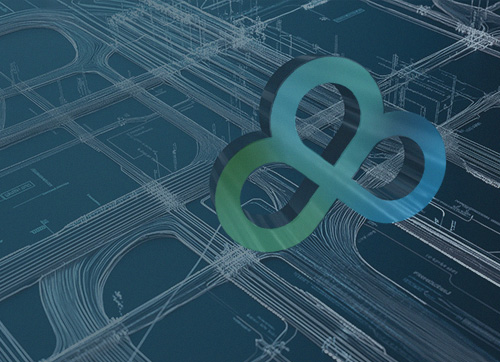USE CASE: ORACLE DATABASE MODERNIZATION
Postgres® migrations made easy—reduce TCO by 80% and accelerate app modernization.
THE CHALLENGE
Simplify your Oracle-to-Postgres migration
Developers are driving Postgres adoption, clearing the path to numerous organizational benefits—data sovereignty, improved TCO, enhanced innovation, multi-model data support, modern cloud-native agility, and faster time to market for next-gen apps. But Oracle migrations get side-tracked by compatibility and migration complexity, performance and optimization challenges, and integration and application compatibility issues.


OUR SOLUTIONS
Accelerate application modernization
EDB Postgres AI eases Oracle-to-Postgres migrations, mitigates migration risks, reduces total cost of ownership (TCO) by up to 80%, and provides the fastest on-ramp to application modernization with AI-assisted tools.
Embrace the open source flexibility of Postgres to power AI, analytics, and transactional workloads—all without slowing business operations.
Integrated Oracle compatibility
Leverage EDB Postgres Advanced Server (EPAS) to deploy modern solutions for transactional, analytical, and AI workloads.
Simplify migration
Modernize your database in 20 days with EDB Migration Copilot, EDB Migration Portal & Migration Toolkit, and Replication Server.
Oracle Migration Estate Assessment
Save up to 80% TCO by identifying which databases to migrate first.
DEMO
DEMO
Seamless Oracle to Postgres Migration with EDB Postgres AI
Seamless Oracle to Postgres Migration with EDB Postgres AI
Embrace the open source flexibility of Postgres to power AI, analytics, and transactional workloads—without impacting business operations.
Minimize Tier 1 application impacts
Reduce application rewrites up to 95% and eliminate disruptions when migrating from Oracle.
Meet strategic migration initiatives, faster
Migrate most Oracle schemas and data in less than 20 days.
Improve operational agility, reduce overhead
Deploy enterprise-grade EDB Postgres AI that delivers open source flexibility, hardened security, and up to 99.999% availability.
Leverage deployment flexibility
Options include on-premises, public/private cloud, and integrated hardware solution.
EDB Postgres AI enables Oracle database modernization

EDB Postgres AI includes the most robust Oracle compatibility engine for Postgres, plus admin-friendly toolsets, and an AI-powered migration copilot that simplifies the migration process, reducing the time and effort to modernize. With EDB Postgres AI’s Oracle compatibility, developers and operators don’t need to learn new skills, reducing the learning curve to adopt Postgres.
Related Products and Solutions
EDB Postgres AI
A modern Postgres data and AI platform for powering mission-critical workloads with flexible deployment across hybrid and multi-cloud.
EDB Postgres Advanced Server
Leverage enterprise-grade, Oracle-compatible Postgres to deploy modern solutions for transactional, analytical, and AI workloads.
EDB Postgres AI Cloud Service
Deploy Oracle-compatible EDB Postgres AI on your cloud account of choice, with up to 99.999% availability. Achieve up to 5x performance compared to open source Postgres.
Legacy App Modernization Use Case
Break free from legacy constraints to grow and innovate faster.
Oracle Migration Calculator
Estimate your savings by migrating from Oracle to Postgres.
Resources
Replacing Oracle with Postgres: How To Successfully Migrate Your Legacy Databases
Cracking the Code: Oracle Database Migration from Assessment to Execution
Embracing the Future of Tech with EDB Postgres: 5 Must-Read Oracle Migration Success Stories
Why Fortune 50 banks are leaving Oracle for EDB Postgres
Decoding Oracle Migration: Insights Into Scope and ROI
Decoding Oracle Migration: Insights into Scope and ROI
Navigating Legacy Database Migration: Mastering Change Management
Oracle Database Modernization— Postgres Migrations Made Easy
Organizational motivators include:
- Reducing cost: Oracle’s high cost reflects restrictive and complicated contracts
- Enhancing development agility and deployment options: 70% of new apps use open source, with enterprises deploying Postgres on multi-cloud and containers to quickly adopt modern architectures
- Innovation and future-proofing: Oracle innovation is proprietary and costly. Postgres paves the way to transactional, analytical, and AI workloads
- Consolidation: Organizations want to focus IT spending on fewer platforms. PostgreSQL fits many workloads
- Developer preference: Year after year, developers express their preference for Postgres. It is fast becoming the platform of choice for modern open source applications.
Here’s what you’ll hear about the delays in moving on from Oracle:
- Migrations can be hard: There is a lot of assessment and effort required across schema, data, and applications, and some organizations don’t want to tackle all that.
- Oracle skills: Businesses have invested in Oracle training and are concerned about losing those skills/expertise.
- Apps designed for Oracle: Oracle specifics are ingrained in the app, so it’s difficult to migrate one without the other.
Migrating to Postgres as an enterprise-grade database solution requires:
- Security and compliance: Pushback from IT and infrastructure teams over enterprise security, performance, and compliance requirements can delay Postgres adoption.
- Flexible architectures: Enterprises may require support for on-premises, cloud environments, and Kubernetes open source container orchestration systems, or any combination of these.
- Zero-downtime concerns: If organizations are going to roll out Postgres across their enterprise, the solution needs to support demanding, tier 1 applications that tolerate near-zero downtime.
Organizational tipping points involve a mix of factors that include the following:
- Oracle contracts are complicated.
- Audits are disruptive.
- There are widely perceived issues with the quality of contracted Oracle support delivery.
- An organization’s customers want their provider to move off of Oracle and onto Postgres.
- The organization wants to embrace AI applications and analytics, and experience Oracle’s shortcomings for these workloads.